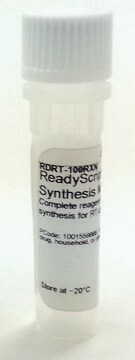10109118001
Roche
Reverse Transcriptase AMV
solution, >50 units/μg protein, suitable for RT-qPCR, suitable for RT-PCR
Sinonimo/i:
amv reverse transcriptase
Autenticatiper visualizzare i prezzi riservati alla tua organizzazione & contrattuali
About This Item
Prodotti consigliati
Stato
solution
Livello qualitativo
Attività specifica
>50 units/μg protein
Caratteristiche
dNTPs included: no
hotstart: no
Confezionamento
pkg of 1,000 U
Produttore/marchio commerciale
Roche
Condizioni di stoccaggio
avoid repeated freeze/thaw cycles
Parametri
42 °C optimum reaction temp.
tecniche
RT-PCR: suitable
RT-qPCR: suitable
input
purified RNA
Metodo di rivelazione
probe-based
Categorie correlate
Descrizione generale
Reverse Transcriptase, AMV is a gene product of the RNA genome of avian myeloblastosis virus. The enzymatically active forms of the purified enzyme are α,ββ and αβ. The molecular weight of the α-subunit is 68 kDa, that of the β-subunit 92 kDa. The mature αβ form, the most active form of Reverse Transcriptase, AMV, includes a RNA-directed DNA polymerase, a DNA-dependent DNA polymerase, a RNase H, and an unwinding activity. Reverse Transcriptase, AMV is used for cDNA synthesis, for synthesis of first strand cDNA for use in subsequent amplification reactions and dideoxy DNA sequencing.
The enzyme can also be used for RNA sequencing, 3′ end labeling of DNA fragments, and the generation of ss probes for genomic footprints.
Reverse Transcriptase AMV requires a primer and Mg2+ or Mn2+ for activity.
The enzyme can also be used for RNA sequencing, 3′ end labeling of DNA fragments, and the generation of ss probes for genomic footprints.
Reverse Transcriptase AMV requires a primer and Mg2+ or Mn2+ for activity.
Specificità
AMV (Avian Myeloblastosis Virus) Reverse Transcriptase is an RNA-directed DNA polymerase and a DNA-dependent DNA polymerase. The AMV reverse transcriptase requires a primer and Mg2+ or Mn2+ for activity.
Heat inactivation: 5 min, 95 °C
Heat inactivation: 5 min, 95 °C
Applicazioni
Reverse Transcriptase AMV is suitable for:
- First- and second-strand cDNA synthesis and synthesis of first strand cDNA for use in subsequent amplification reactions (RT-PCR)
- Dideoxy DNA sequencing
- Primer extension
- RNA sequencing
- 3′-end labeling of DNA fragments
- Generation of single-stranded probes for genomic footprint experiments
Caratteristiche e vantaggi
- Efficiently transcribes total RNA, mRNA, viral RNA and RNA rich in secondary structures
- Procure full length cDNA fragments up to 12 kb
- Higher thermostability (up to 60°C) and specificity than M-MuLV Reverse Transcriptase
Confezionamento
1 kit containing 2 components
Qualità
Absence of contaminants: Tested for the absence of detectable nonspecific RNases and nonspecific DNases in incubations with various nucleic acids (analyzed by gel electrophoresis) according to the current Quality Control procedures.
Function test: Reverse Transcriptase AMV is function tested in the cDNA Synthesis Kit and RT-PCR.
Function test: Reverse Transcriptase AMV is function tested in the cDNA Synthesis Kit and RT-PCR.
Definizione di unità
1 unit is the enzyme activity that incorporates 1 nmol of [3H]-dTMP into acid-precipitable products in 10 minutes at +37 °C with poly(A)+ · d(pT)15 as template primer.
Volume Activity: 20-25 U/μl. Please refer to the Certificate of Analysis for more information.
Volume Activity: 20-25 U/μl. Please refer to the Certificate of Analysis for more information.
Nota sulla preparazione
Storage buffer: 200 mM potassium phosphate, 2 mM dithiothreitol, 0.2% Triton X-100 (v/v), 50% glycerol (v/v), pH 7.2.
Stoccaggio e stabilità
Store at -15–-25 °C. (Storage at -70 °C is more likely to deteriorate the enzyme via repeated freezing and thawing.)
Altre note
For life science research only. Not for use in diagnostic procedures.
Solo come componenti del kit
N° Catalogo
Descrizione
- Reverse Transcriptase AMV 20-25 U/μl
- First-strand cDNA Synthesis Buffer 5x concentrated
Codice della classe di stoccaggio
12 - Non Combustible Liquids
Classe di pericolosità dell'acqua (WGK)
WGK 1
Punto d’infiammabilità (°F)
does not flash
Punto d’infiammabilità (°C)
does not flash
Scegli una delle versioni più recenti:
Possiedi già questo prodotto?
I documenti relativi ai prodotti acquistati recentemente sono disponibili nell’Archivio dei documenti.
I clienti hanno visto anche
Maternal licking regulates hippocampal glucocorticoid receptor transcription through a thyroid hormone-serotonin-NGFI-A signalling cascade.
Hellstrom I C, et al.
Philosophical transactions of the Royal Society of London. Series B, Biological sciences, 367(1601), 2495-2510 (2012)
Lucile Pantel et al.
Molecular cell, 70(1), 83-94 (2018-04-07)
Growing resistance of pathogenic bacteria and shortage of antibiotic discovery platforms challenge the use of antibiotics in the clinic. This threat calls for exploration of unconventional sources of antibiotics and identification of inhibitors able to eradicate resistant bacteria. Here we
Tie-Yuan Zhang et al.
The Journal of neuroscience : the official journal of the Society for Neuroscience, 30(39), 13130-13137 (2010-10-01)
Parenting and the early environment influence the risk for various psychopathologies. Studies in the rat suggest that variations in maternal care stably influence DNA methylation, gene expression, and neural function in the offspring. Maternal care affects neural development, including the
Jessica N Saykally et al.
PloS one, 4(12), e8460-e8460 (2009-12-31)
Four genome-wide association studies mapped an "obesity" gene to human chromosome 10p11-12. As the zinc finger E-box binding homeobox 1 (ZEB1) transcription factor is encoded by the TCF8 gene located in that region, and as it influences the differentiation of
Anirudh Chakravarthy et al.
Life science alliance, 4(12) (2021-10-02)
The continued resurgence of the COVID-19 pandemic with multiple variants underlines the need for diagnostics that are adaptable to the virus. We have developed toehold RNA-based sensors across the SARS-CoV-2 genome for direct and ultrasensitive detection of the virus and
Il team dei nostri ricercatori vanta grande esperienza in tutte le aree della ricerca quali Life Science, scienza dei materiali, sintesi chimica, cromatografia, discipline analitiche, ecc..
Contatta l'Assistenza Tecnica.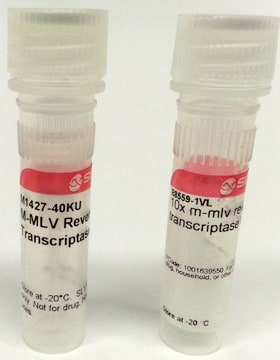

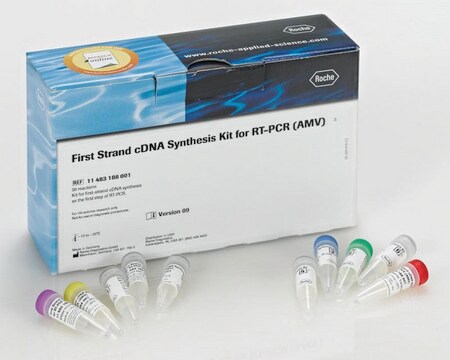

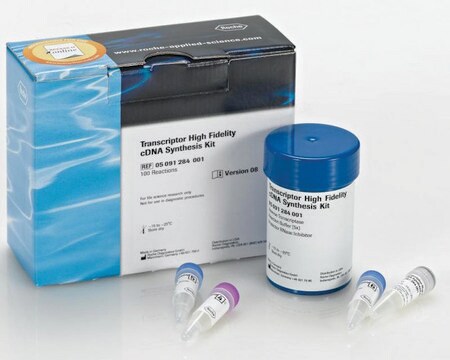
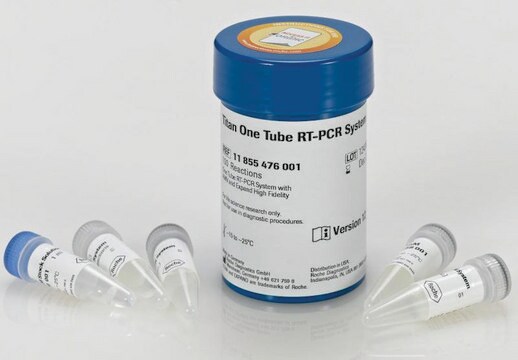
![Enhanced Avian Reverse Transcriptase [eAMV™ RT] For reverse transcription at higher temperatures & rare mRNAs](/deepweb/assets/sigmaaldrich/product/images/496/245/af9bcef6-1474-494b-8fba-32ca0fd56c42/640/af9bcef6-1474-494b-8fba-32ca0fd56c42.jpg)

